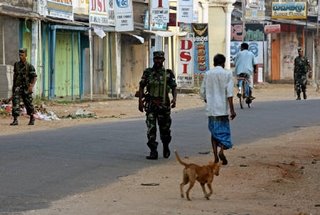Latest Sri Lanka Violence Makes War Harder To Avoid
 Reuters
ReutersMay 1, 2006
By Peter Apps
COLOMBO (Reuters) - After a week in which Sri Lanka came to the brink of civil war faster than anyone thought possible, analysts and diplomats say that, while both sides say they want peace, rising violence could lead to open conflict.
The government halted the air strikes on Tamil Tiger rebel areas that followed a suspected rebel suicide attack on the army headquarters, but attacks against troops continue.
"Last week, I was worried we would be at war by the end of the day," said a Western diplomat. "Now, it's better. But I'm expecting surprises. Bad ones."
Such was the fear after the Tuesday and Wednesday air strikes -- the first since a 2002 truce halted two decades of fighting -- that people were relieved there were only four attacks on the military on Thursday, killing six.
But since then violence has continued to rise, with artillery duels and naval clashes now commonplace. On Sunday, the rebels said they crossed into government territory to raid camps run by renegade ex-rebels, killing 20.
The only significant good news, diplomats and analysts say, is the absence of new air strikes or attacks in the increasingly jittery capital, Colombo, which would shatter confidence in the island's $20 billion economy.
"It is escalating," said Helen Olafsdottir, spokeswoman for the Nordic-staffed truce monitoring mission. "Both sides seem to be breaching the ceasefire agreement and the breaches seem to be becoming more serious. But most people who suffer are civilians."
If suspected rebels keep throwing grenades into military checkpoints and blasting military vehicles with claymore fragmentation mines, more hawkish voices in President Mahinda Rajapakse's government will want the bombing restarted.

DEVASTATING RETALIATION
The Liberation Tigers of Tamil Eelam (LTTE), whose fight for an ethnic Tamil homeland in the north and east has killed more than 64,000 on both sides, have vowed a "devastating and disabling" retaliation if strikes resume.
The latest violence began in the first week of April, with the Tigers angry the government had not reined in renegade ex-rebels led by former Tiger Karuna Amman, who had been attacking the rebels from inside government territory.
It was the second spike in recent months. In December and January, Tiger ambushes on troops raised war fears before the two sides agreed to meet.
The government promised in February at talks in Geneva to stop armed groups operating, but was seen to have done nothing. The army denies backing Karuna, but Nordic truce monitors say it has at least turned a blind eye.
The Tigers deny being behind any attacks on the army, but few believed them.
Most analysts expected that talks scheduled for April 19-21 in Geneva would be cancelled, but there was brief optimism after the rebels recommitted themselves to talks a week late, once they had met eastern rebel commanders.
But the rebels cancelled the road and sea convoy transporting their eastern leaders, escorted by the unarmed Nordic Sri Lanka Monitoring Mission (SLMM), at the last minute. Then, they pulled out of talks indefinitely.
FAILURE TO COMPROMISE
Both sides say they remain committed to going to meeting in Geneva, but with the dispute on transport of eastern commanders now centring on whether a seaplane carrying them should land in government or rebel territory, few are hopeful.
Analysts say the Tiger attacks on the military and on civilians from the Sinhalese majority were aimed at provoking retaliation and gaining international sympathy. The government said it would not be provoked, but changed its tune after the suicide blast.
After the attack on army chief Lieutenant-General Sarath Fonseka and the air strikes that followed, many believed the ceasefire was dead in the water.
But although SLMM says the two sides are increasingly in breach of the truce, along most of the front line it continues to hold. With the exception of Sunday's Tiger raid on Karuna camps in government territory, there has been no hand-to-hand fighting.
The recent violence may be simple brinkmanship as both sides seek a position of strength ahead of the talks, but that does not mean it cannot run out of control.
Diplomats say that, while hardliners on both sides may want war, the problem is that even the moderates are unwilling to make the compromises needed to stop escalation.
Local exchanges of fire are already followed by local artillery duels, but one fear is that -- even without one side launching an offensive -- fighting could spread up and down the entire front line without anyone being able to stop it.
"In the absence of going to Geneva, violence will not come down," said Johan Perera, head of the National Peace Council think-tank. "But if it escalates catastrophically, I think it will be because of a deliberate act."
© Reuters 2006. All Rights Reserved.

0 Comments:
Post a Comment
<< Home